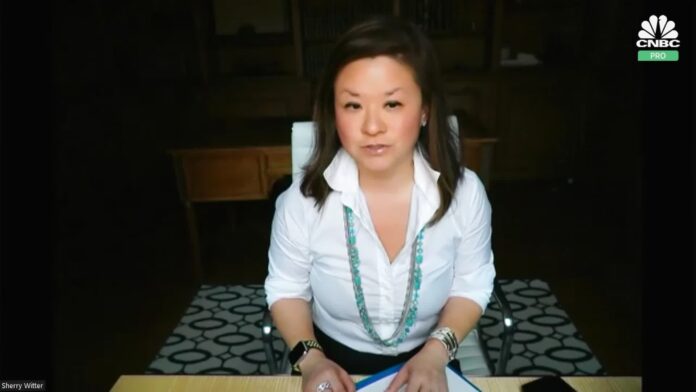The Witter Family Office, which has deep roots in Wall Street, is overhauling its large cryptocurrency and blockchain portfolio but “continues to believe” in the sector despite the recent price declines, according to its co-founder. Sherry Pryor Witter, CEO of the Witter Family Office, said crypto and blockchain accounted for about 40% of the office’s assets at their peak. With the recent losses in both tokens and companies, Witter has sold off all but the top 10 crypto tokens and written down many of its venture capital investments, she said. But, she said, she still believes strongly in the asset class. “I think this is a great time to get into the better projects of crypto,” said Witter, who started buying crypto tokens in 2018. “I feel like this crypto flush we had really did a great job of getting rid of the bad actors. The recent events have been unfortunate but if you can pick the right projects, … I think the returns will be strong going forward.” Witter is one of a large and growing group of family offices that have become important players in crypto. A recent survey of family offices in a BNY Mellon and Harris poll found that 77% of family offices were exploring or investing in crypto. Fully one in five were actively invested in crypto. Family innovation Witter said innovation has always been at the heart of the Witter family. Dean Witter, who started selling stocks and bonds door-to-door, founded Dean Witter & Co. in 1924 and built it into one of the largest brokerage firms in the U.S. Sherry Pryor Witter, who is married to Michael D. Witter, Dean Witter’s grandson, ran six hedge funds and worked for investor Eddie Lampert before co-launching the Witter Family Office with Michael in 2011. Like many of the newer family offices, Witter sets aggressive investing targets and aims to outperform many of the public markets for stocks and bonds. “We are in growth mode,” she said. She has four main strategies — equities, private equity, venture capital and trading. Currently, she said the trading business has been the strongest, with a focus on trading the wild daily swings in commodities, foreign exchange and crypto. Her trading profits have “more than offset” her other declines in crypto, she said, including losses from venture capital investments in crypto companies. “In my crypto trading, I’ve done very well,” she said. Witter admits, however, that her broader strategy of becoming a “crypto and blockchain” family office has had to shift. She has sold off the office’s smaller and less successful tokens to focus on what she calls “the top 10,” which includes bitcoin, ethereum and the other largest tokens. Her venture and direct investing strategy, where the family office took stakes in crypto and blockchain startups, has been whittled down even more. “For my venture capital side, emotionally I have marked it down to zero,” she said. “I think technically it may be down 70%, maybe 75%, depending on the project. I didn’t liquidate. But in my mind, I’ve marked them to zero.” Her favorite investments in crypto right now include Flare Network, which she says “will become the Swift of crypto,” and Homium, a digital platform for real estate and real estate financing. Flushing out ‘bad actors’ Witter said the current crash and wave of bankruptcies is the result of “bad actors” and speculators who needed to be cleansed from the crypto market, none of whom have led her to deviate from her central thesis. She assumes that blockchain and crypto will revolutionize payment systems, finance and banking over the long term, and has been in frequent contact with other family offices and major crypto investors about whether to sell. “The people that I know in crypto are very tight,” she said. “It felt like we were on a plane going down, and we’re all holding on to the arm rest, we’re shaking and we’re ‘are you going to pull the chute? No. Are you going to pull the chute? No.’ So no one was bailing. No one was going to sell their positions. But we were going down together. If you have enough dry powder, you want to hold on to it. … I believe in the technology.” When it comes to stocks, Witter said that while there is still likely to be volatility this summer, “this is a great point to get into equities, to get into longer-term long-only positions. Because I’m looking at P/E [ratios] and I’m looking at valuations. I’m not able to call the bottom but I feel like we’re close.”
© heardonwallstreet.com


